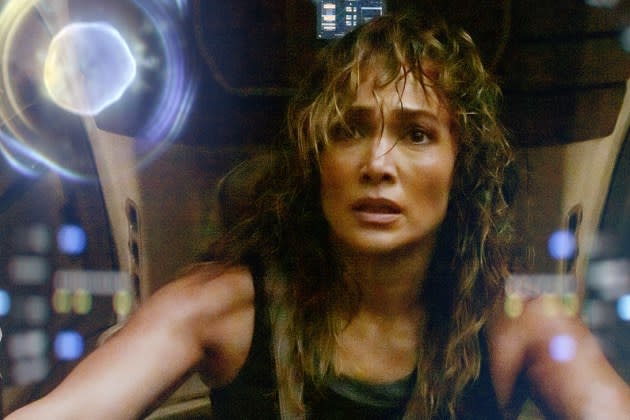‘Atlas’ Review: Jennifer Lopez and Simu Liu in Another Netflix Movie Made to Half-Watch While Doing Laundry

Technically, Atlas is a sci-fi flick. Set some unspecified number of years in the future, the Brad Peyton-directed feature concerns a data analyst (Jennifer Lopez) tasked with stopping “the world’s first AI terrorist,” a robot named Harlan (Simu Liu) who’d broken his own programming to orchestrate the slaughter of millions.
But Blade Runner this isn’t, and not just because its tepid script and uninspired visuals place Atlas within the ever-expanding box of Netflix movies best half-watched on planes. The robot war is mere pretext for the saga of a woman learning to love again, starring a celebrity whose public persona is largely built around her willingness to let herself love again. Never mind the fact that there is no actual human love interest — in structure and theme, Atlas is a J.Lo rom-com in shiny metal packaging.
More from The Hollywood Reporter
Jennifer Lopez at the Met Gala: The Night's Co-Host Shines in Schiaparelli Butterfly Gown
Jennifer Lopez at the Met Gala: Look Back at All of the A-Lister's Ensembles Over the Years
Like its prickly heroine, though, Atlas takes time to reveal its true self. The first act plays like a glossier ripoff of Aliens, with Atlas being recruited by international military general Booth (Mark Strong) to help corner Harlan on the remote planet he’s been hiding on for the past 28 years. Not only is Atlas a genius, as telegraphed by a morning routine that includes beating her holographic virtual assistant at chess for the 71st game in a row. She knows Harlan more intimately than perhaps any living soul: The daughter of his late creator (Lana Parilla), she’s the closest thing he has to a sister.
Understandably, Harlan’s betrayal has left Atlas guarded, suspicious of AIs and wary of being hacked. Where Colonel Banks (Sterling K. Brown) and his squadron tout the benefits of Neural Links — earpieces that facilitate perfect two-way integration between human brains and AI-controlled armors, like J.A.R.V.I.S. and Iron Man’s bond on steroids — Atlas insists on taking the mission fully analog. (“Paper? Where’d you find a printer?” a younger soldier laughs as she hands out copies of the briefing.) But when the ship is attacked immediately upon landing, Atlas is forced into a mech suit of her very own, this one controlled by an AI calling himself Smith (Gregory James Cohan in a voice-only role).
It is here that Atlas‘ real journey finally reveals itself. Atlas and Smith press on with their original mission to neutralize Harlan, under relentless attack from his forces. But long stretches of the two-hour run time see Atlas alone in her suit with only Smith for company. She lets her guard down bit by bit, opening up about her childhood and engaging in friendly-ish debate about what counts as life. He grows more fluent in her native language of sarcasm. We might not be rooting for them to kiss — honestly, I don’t even know how that’d work — but Cohan and Lopez’s chemistry elevates otherwise unremarkable dialogue into passably amusing, occasionally touching banter.
As the danger around them intensifies, so does their connection. Atlas and Smith inch closer to 100% synchronization, at which point they will become, as Banks had previously explained, “not human or AI but something new, a perfect symbiosis.” This looks much less cool than it sounds; onscreen, it primarily manifests as an annoying habit of finishing each other’s sentences.
Atlas demonstrates very little curiosity in general about the social or philosophical issues raised by its premise. What’s to prevent the current generation of androids from going rogue as Harlan once did? Atlas vaguely explains the new models are just “better.” Who are the AIs without their homo sapiens counterparts? We never meet any solo AIs but Harlan. How did our relationship to technology change after Harlan broke so many machines free of their programming? We don’t see enough of everyday life in this world to guess.
What the film does want to get into is Atlas’ trust issues. Ostensibly, the stakes of Atlas’ mission are as high as they get, since Harlan poses a threat to all of Earth. But because the story’s scope barely extends beyond Atlas and Smith, with no other characters or relationships meaningful enough to invest in, her beef with Harlan reads as entirely personal. He’s akin to the ultimate toxic ex, who left Atlas shattered and even now refuses to leave her alone. By the same logic, Smith plays the role of the new beau who heroically teaches Atlas that it’s safe to love again. If you told me Atlas started as a cut segment from This Is Me … Now: A Love Story, I’d probably believe you.
The interstellar conflict comes to a head, of course, in the last and longest of the movie’s polished but totally unmemorable CG-heavy action sequences. But its emotional climax arrives just afterward in the form of a heartfelt speech extolling, among other things, “small quiet gestures of affection.”
For a futuristic, planet-hopping adventure, Atlas feels awfully tiny; as a romance (minus the actual romance), it treads no new emotional terrain. But there’s something oddly relatable, even romantic about its hope that healing one’s heart might be the first step in saving the world.
Best of The Hollywood Reporter